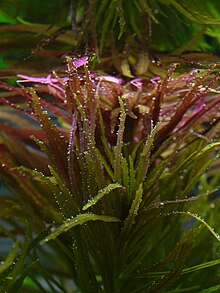Limnophila is a genus of flowering plants in the family Plantaginaceae. It is distributed in tropical and subtropical regions of Africa, Asia, Australia, and the Pacific Islands.[2] Species are known commonly as marshweeds.[3]
| Limnophila | |
|---|---|

| |
| Limnophila aromatica | |
| Scientific classification | |
| Kingdom: | Plantae |
| Clade: | Tracheophytes |
| Clade: | Angiosperms |
| Clade: | Eudicots |
| Clade: | Asterids |
| Order: | Lamiales |
| Family: | Plantaginaceae |
| Tribe: | Gratioleae |
| Genus: | Limnophila R.Br. |
| Species | |
| Synonyms[1] | |
| |
These are annual or perennial herbs. They grow in wet habitat, such as marshes, and some are aquatic. Some species are glandular and aromatic. Plants of the genus vary in form, from erect to prostrate, and with branching or unbranched stems. Submerged leaves are whorled; aerial leaves are whorled or oppositely arranged. The leaves are lance-shaped or pinnate, and the blades have smooth or serrated edges. Some species have flowers solitary in the leaf axils, and others have flowers in inflorescences. The sepals are arranged in a tubular calyx, and the corolla is tubular or funnel-shaped. The corolla has a lower lip with three lobes and an upper lip that is unlobed or double-lobed.[2]
Cabomba caroliniana, a plant in a different family, is noted for having leaves that resemble those of Limnophila.[4]
Systematics
editThere are about 40 species in the genus.[2]
- Limnophila aquatica
- Limnophila aromatica – swampleaf, rice paddy herb
- Limnophila bangweolensis
- Limnophila barteri
- Limnophila borealis
- Limnophila ceratophylloides
- Limnophila chinensis – finger grass
- Limnophila connata
- Limnophila dasyantha
- Limnophila erecta
- Limnophila heterophylla
- Limnophila indica – Indian marshweed
- † Limnophila limnophiloides
- Limnophila repens
- Limnophila rugosa
- Limnophila sessiliflora – ambulia
- Limnophila tenera
References
edit- ^ "Limnophila R.Br. | Plants of the World Online | Kew Science". Plants of the World Online. Retrieved 2020-06-02.
- ^ a b c d Limnophila. Flora of China.
- ^ Limnophila. Integrated Taxonomic Information System (ITIS).
- ^ Cabomba caroliniana. Flora of North America.
- ^ Limnophila. The Plant List.
- ^ GRIN Species Records of Limnophila. Archived 2015-09-24 at the Wayback Machine Germplasm Resources Information Network (GRIN).